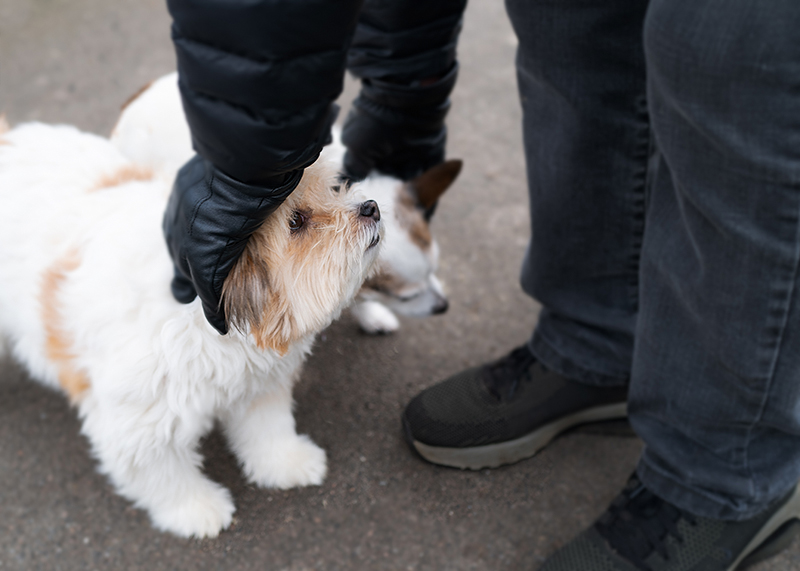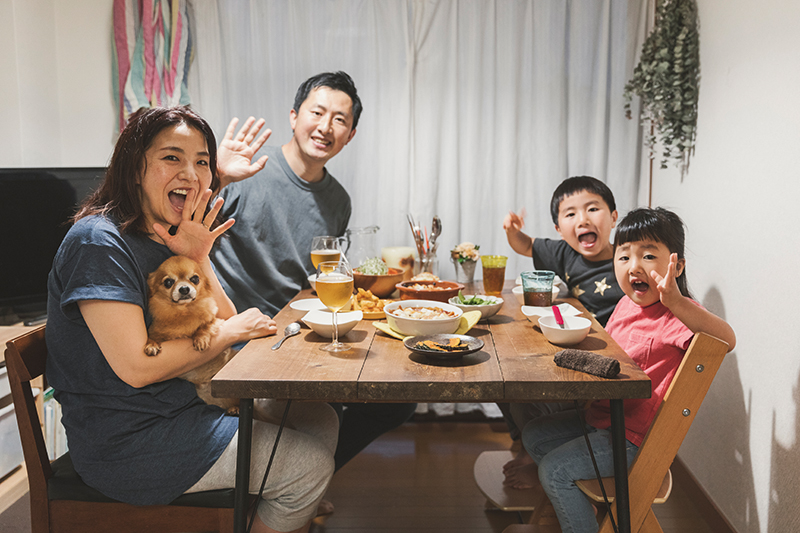We want to be our dogs’ best friends, but all too often people unintentionally do things that their dogs hate. Trainer and behaviourist Jackie Drakeford advises, and suggests some alternatives your dog might prefer.

Patting a dog on the head can make him feel vulnerable.
1. Don’t pat me on the head or stare into my eyes
Heads are sensitive, and robust patting is very unpleasant to dogs. It also makes them feel vulnerable, because if another animal were to attack, it would likely ‘disarm’ the dog first by going for his head. We wouldn’t like our heads being patted — and dogs are no different. They’ll trust you much more if you stroke them gently on their sides and chest. If they offer their faces for caressing — which is quite a compliment — you should smooth them gently around their cheeks and ears.
Humans can out-stare animals easily, and animals hate it. Staring can imply an imminent attack. Herding breeds such as Border Collies have a strong stare bred into them to assist with moving livestock, but if they use this trait on other dogs, it can precipitate a fight. If you want to look into a dog’s eyes, it is much more polite to glance softly for a moment, then look away.

Don’t forget to let your dog check the ‘weemail’.
2. Please let me sniff
To us, walks are about exercise, and our world is largely visual. But for dogs, much of the joy of walking outdoors lies in using their phenomenal sense of smell. They need to check the ‘weemails’ from other dogs, and ‘read the papers’ by finding out what wildlife has been along the track recently. Is it still there? What has happened here? It makes me so sad when I see dogs dragged away from a really interesting scent, or not being allowed to leave their own messages. Mental exercise is every bit as important as physical for maintaining our dogs’ health and sense of fulfilment. If you let them finish a sniff, they will often look at you to share how interesting it is: ‘Cor! Smell that!’. Sometimes you can tell what probably left the smell — even though you can’t smell it yourself — by your dog’s body language. It’s very bonding when you give them time to sniff and then acknowledge the communication with you that follows. This is one way of being a top owner!

Feeding dogs together can be a cause of anxiety.
3. Keep me safe at mealtimes
So many times I’ve seen dogs threatened and put off their food by other household dogs, while the owner is unaware or does nothing to prevent it. This can lead to profound anxiety from which spring behaviour and health problems. You would be very unhappy if another human snatched your meal away every time you tried to eat, so dogs should be fed where they can each eat in peace, without fear of losing their meal to another.
4. Don’t bring another dog into the home without considering the upheaval FOR me
Another adult dog is not automatically going to be a friend, especially if he or she has come from a difficult background and feels the need to assert themself. Many multi-dog households exist under a state of armed truce, and if there is a real falling out, tolerance may never be regained, especially with bitches. The opposite can happen too, where the dogs team up, run amok, and ignore the humans! Puppies bring their own challenges: adult dogs should not be expected to discipline the puppy, or even like it, and need space and family time away from the sharp-toothed little monster! Sometimes a resident bitch will mother a puppy, which is very helpful, though they must still be separated for training. More often, the puppy is simply tolerated until he is old enough to behave properly around his companions. I have had six dogs together, and know others who have had 10 or more. It can be done, but like the swan, what seems to be easy sailing really masks a lot of hidden paddling work!
5. Don’t use certain air fresheners, pot-pourri, incense, or ‘fragrant’ household cleaners
To a dog’s fabulous sense of smell, these are vile. Imagine being shut in with a really horrible smell you can’t avoid. If scented products are your pleasure, confine them to certain rooms and have some unscented space your dog can retire to if he wants. This means avoiding using them in the car too. You can’t tell if dogs get pounding headaches and feel sick the way you would if trapped in with strong scents you dislike, but you can safely say that there could be quite a lot of physical and mental distress, which could cause long-term health issues. I tell my dogs this every time they try to roll in fox poo!
6. Don’t give me food I don’t like
So many people see a dog’s digestive system as similar to a dustbin — and in fairness this can be an accurate description with some — but many other dogs are more discerning. If a dog is telling you loud and clear that he doesn’t like the food you are providing, listen to him, and find something he does like. It may be more expensive, but you will save on waste as well as vet bills, because you only get out in terms of health what you put in by means of quality. The dog is not trying to manipulate you into offering ‘better’ food; remember that you don’t eat things you don’t like either. When you find food your dog does enjoy, don’t play the puritan by trying to make him finish the old food first; give the remainder to a dog rescue society — some dogs will love it.

Teach children to stroke dogs gently, and to always ask first.
7. I don’t really like hugging
We are simian and love to hug; dogs are canine and don’t. Normally, the only times dogs would encounter being embraced and squeezed would be seconds before they were killed by a predator, or when mating. But with the latter, dogs normally have prolonged courtship rituals, which involve a lot of testing to see if the other is receptive, and are very respectful if rebuffed. Because humans hug, many of our dogs have come to accept it, and as we clearly mean well by it, some will even enjoy it if given by their trusted humans. But that does not mean people outside this group should just expect to hug any dog, and you need to be especially vigilant around children who might try to hug because they know no better. Social media is full of photos of very unhappy dogs being hugged by children. We should instead teach our little ones to stroke dogs gently in the direction the fur lies, avoid sensitive areas, and always ask first. That way, everyone stays safe and happy.
8. Why are you telling me off?
If you shout at a dog because he has done something you don’t want, he does not understand what you do want. All he knows is that you have become flaky, so he offers submissive behaviour that humans think is ‘guilt’. It is up to you to arrange your dogs’ lives so that doing what you want is easy and rewarding, and doing what you don’t want is difficult or impossible. Put away what you don’t want chewed, give plenty of supervised potty breaks when house-training, and ensure the dog can’t get at bins. Good management makes good dogs.

Some family gatherings are too noisy for sensitive dogs.
9. It’s too noisy
Some dogs enjoy a raucous family environment, but for others it is deeply disturbing. If their humans are shouting at the television, playing noisy computer games, or arguing, dogs have the double whammy of sounds that hurt because of their mega-sensitive hearing, and sounds that make them feel insecure because their humans seem aggressive. You can help enormously by providing the dog with a quiet space to retreat to when you are getting loud, and by using headphones when playing computer games and music.

10. I don’t want to live with prey species
Some breeds of dog are very much more prey driven than others, and can become really stressed if typical prey species, such as rats or rabbits, are kept in the home. It stresses the prey species too; I have seen some very unhappy small pets being eyeballed day after day by frustrated dogs who are just waiting for their chance. Some dogs can be trained to tolerate some prey species, some will even grow to like them, but it isn’t a given, and you never know how the dog will be until the situation is put to the test. Small furries are best kept right away, in their own room or in well fenced off outdoor accommodation.







